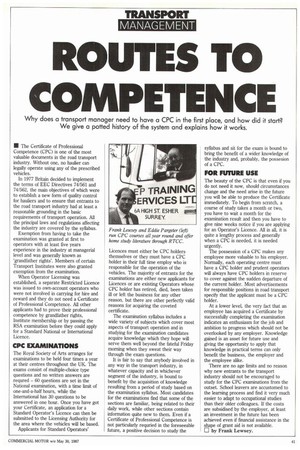ROUTES TO COMPETENC
Page 43

If you've noticed an error in this article please click here to report it so we can fix it.
Why does a transport manager need to have a CPC in the first place, and how did it start? We give a potted history of the system and explains how it works.
• The Certificate of Professional Competence (CPC) is one of the most valuable documents in the road transport industry. Without one, no haulier can legally operate using any of the prescribed vehicles.
In 1977 Britain decided to implement the terms of EEC Directives 741561 and 74/562, the main objectives of which were to establish a new form of quality control for hauliers and to ensure that entrants to the road transport industry had at least a reasonable grounding in the basic requirements of transport operation. All the principal laws and regulations affecting the industry are covered by the syllabus.
Exemption from having to take the examination was granted at first to operators with at least five years experience in the industry at managerial level and was generally known as 'grandfather rights'. Members of certain Transport Institutes were also granted exemption from the examination.
When Operator Licensing was established, a separate Restricted Licence was issued to own-account operators who were not involved in carrying for hire and reward and they do not need a Certificate of Professional Competence. All other applicants had to prove their professional competence by grandfather rights, Institute membership or by passing the RSA examination before they could apply for a Standard National or International Licence.
CPC EXAMINATIONS
The Royal Society of Arts arranges for examinations to be held four times a year at their centres throughout the UK. The exams consist of multiple-choice type questions and no written answers are requred — 60 questions are set in the National examination, with a time limit of one-and-a-half hours, while the International has 30 questions to be answered in one hour. Once you have got your Certificate, an application for a Standard Operator's Licence can then be submitted to the Licensing Authority for the area where the vehicles will be based.
Applicants for Standard Operators' Licences must either be CPC holders themselves or they must have a CPC holder in their full time employ who is responsible for the operation of the vehicles. The majority of entrants for the examinations are either new applicants for Licences or are existing Operators whose CPC holder has retired, died, been taken ill or left the business for any other reason, but there are other perfectly valid reasons for acquiring the coveted certificate.
The examination syllabus includes a wide variety of subjects which cover most aspects of transport operation and in studying for the examination candidates acquire knowledge which they hope will serve them well beyond the fateful Friday morning when they sweat their way through the exam questions.
It is fair to say that anybody involved in any way in the transport industry, in whatever capacity and in whichever segment of the industry, is bound to benefit by the acquisition of knowledge resulting from a period of study based on the examination syllabus. Most candidates for the examinations find that some of the sections are familiar, being related to their daily work, while other sections contain information quite new to them. Even if a Certificate of Professional Competence is not particularly requried in the foreseeable future, a positive decision to study the syllabus and sit for the exam is bound to bring the benefit of a wider knowledge of the industry and, probably, the possesion of a CPC.
FOR FUTURE USE
The beauty of the CPC is that even if you do not need it now, should circumstances change and the need arise in the future you will be able to produce the Certificate immediately. To begin from scratch, a course of study takes a month or two, you have to wait a month for the examination result and then you have to give nine weeks notice if you are applying for an Operator's Licence. All in all, it is quite a lengthy process and generally when a CPC is needed, it is needed urgently.
The possession of a CPC makes any employee more valuable to his employer. Normally, each operating centre must have a CPC holder and prudent operators will always have CPC holders in reserve to cover against the sudden departure of the current holder. Most advertisements for responsible positions in road transport specify that the applicant must be a CPC holder.
At a lower level, the very fact that an employee has acquired a Certificate by successfully completing the examination indicates an enthusiasm for the job and ambition to progress which should not be overlooked by any employer. Knowledge gained is an asset for future use and giving the opportunity to apply that knowledge in practical terms can only benefit the business, the employer and the employee alike.
There are no age limits and no reason why new entrants to the transport industry should not be encouraged to study for the CPC examinations from the outset. School leavers are accustomed to the learning process and find it very much easier to adapt to occupational studies than their older colleagues. If the costs are subsidised by the employer, at least an investment in the future has been achieved even if financial assistance in the shape of grant aid is not available. 0 by Frank Lewsey.












































































